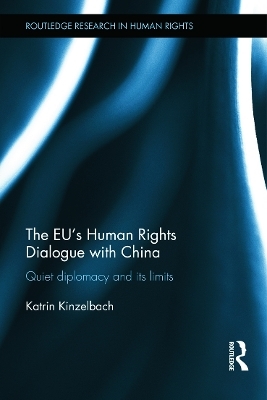
The EU's Human Rights Dialogue with China
Quiet Diplomacy and its Limits
Seiten
2014
Routledge (Verlag)
978-0-415-69846-7 (ISBN)
Routledge (Verlag)
978-0-415-69846-7 (ISBN)
The European Union uses a confidential, institutionalized Dialogue to raise human rights concerns with China, but little is publicly known about its set-up, its substance, its development over time and its impact.
This book provides the first detailed reconstruction and assessment of the EU’s responses to human rights violations in China from 1995 to the present day. Using classified documents in the EU’s historical archives and interviews with diplomats, officials and human rights experts in Europe, China and the United States, Kinzelbach lifts the veil of secrecy on the EU-China Human Rights Dialogue and provides a rare insight into how the European Union and China conduct quiet diplomacy on human rights. The book reconstructs the evolution of the Dialogue and the EU’s internal debate on the merits of quiet diplomacy, and draws comparisons with the approach of other actors, notably that of the United States. In doing so, the EU’s relative impact is concluded to be tenuous if not counter-productive. The book also chronicles and analyzes numerous human rights concerns that were raised in the period, ranging from structural issues to individual cases.
This ground-breaking, in-depth case study will be of interest to students and scholars of international politics, human rights, international law, EU politics, especially the EU’s Common Foreign and Security Policy, and Chinese politics.
This book provides the first detailed reconstruction and assessment of the EU’s responses to human rights violations in China from 1995 to the present day. Using classified documents in the EU’s historical archives and interviews with diplomats, officials and human rights experts in Europe, China and the United States, Kinzelbach lifts the veil of secrecy on the EU-China Human Rights Dialogue and provides a rare insight into how the European Union and China conduct quiet diplomacy on human rights. The book reconstructs the evolution of the Dialogue and the EU’s internal debate on the merits of quiet diplomacy, and draws comparisons with the approach of other actors, notably that of the United States. In doing so, the EU’s relative impact is concluded to be tenuous if not counter-productive. The book also chronicles and analyzes numerous human rights concerns that were raised in the period, ranging from structural issues to individual cases.
This ground-breaking, in-depth case study will be of interest to students and scholars of international politics, human rights, international law, EU politics, especially the EU’s Common Foreign and Security Policy, and Chinese politics.
Katrin Kinzelbach is associate director of the Global Public Policy Institute in Berlin and visiting professor at the School of Public Policy, Central European University in Budapest.
Dedication Acknowledgements Introduction 1. Set-up and Content of the EU-China Human Rights Dialogue 2. 1995-1997: From Public Condemnation to Quiet Diplomacy 3. 1998-1999: Tactical Concessions Abroad and Repression at Home 4. 2000-2002: From Litmus Test to Breach of Trust 5. 2003-2004: Human Rights Diplomacy in a Honeymoon Relationship 6. 2005-2006: Dialogue Fatigue Meets Growing Confidence 7. 2007-2008: Principles Between Stand-off and Sweet-Talk 8. 2009-2010: Dialogue Ritual and Power Shift Conclusion References
| Erscheint lt. Verlag | 8.10.2014 |
|---|---|
| Reihe/Serie | Routledge Research in Human Rights |
| Verlagsort | London |
| Sprache | englisch |
| Maße | 156 x 234 mm |
| Gewicht | 476 g |
| Themenwelt | Recht / Steuern ► Allgemeines / Lexika |
| Recht / Steuern ► EU / Internationales Recht | |
| Recht / Steuern ► Öffentliches Recht ► Völkerrecht | |
| Sozialwissenschaften ► Politik / Verwaltung ► Staat / Verwaltung | |
| Sozialwissenschaften ► Soziologie ► Spezielle Soziologien | |
| ISBN-10 | 0-415-69846-4 / 0415698464 |
| ISBN-13 | 978-0-415-69846-7 / 9780415698467 |
| Zustand | Neuware |
| Haben Sie eine Frage zum Produkt? |
Mehr entdecken
aus dem Bereich
aus dem Bereich
Unitas Europae | Band 1 – 12 | Gesamtausgabe 2021/22
Buch | Hardcover (2022)
Nomos (Verlag)
1.890,00 €
Zugleich Band 12 der Enzyklopädie Europarecht
Buch | Hardcover (2022)
Nomos (Verlag)
198,00 €


